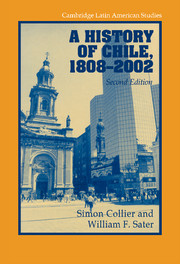Book contents
- Frontmatter
- Contents
- List of maps
- Preface to the Second Edition
- A note on geography
- CAMBRIDGE LATIN AMERICAN STUDIES
- PART I Birth of a nation-state, 1800s–1830s
- PART II The rise of a republic, 1830s–1880s
- PART III The nitrate era, 1880s–1930s
- PART IV Industrial advance and the dawn of mass politics, 1930s–1960s
- PART V Democracy and dictatorship, 1960s–2000s
- 11 Revolution in liberty, 1964–70
- 12 The Chilean road to socialism, 1970–73
- 13 The Pinochet years
- 14 Re-encounter with history, 1990–2002
- Glossary of Spanish terms
- Initials and acronyms
- Further reading
- Index
11 - Revolution in liberty, 1964–70
Published online by Cambridge University Press: 05 June 2012
- Frontmatter
- Contents
- List of maps
- Preface to the Second Edition
- A note on geography
- CAMBRIDGE LATIN AMERICAN STUDIES
- PART I Birth of a nation-state, 1800s–1830s
- PART II The rise of a republic, 1830s–1880s
- PART III The nitrate era, 1880s–1930s
- PART IV Industrial advance and the dawn of mass politics, 1930s–1960s
- PART V Democracy and dictatorship, 1960s–2000s
- 11 Revolution in liberty, 1964–70
- 12 The Chilean road to socialism, 1970–73
- 13 The Pinochet years
- 14 Re-encounter with history, 1990–2002
- Glossary of Spanish terms
- Initials and acronyms
- Further reading
- Index
Summary
Juan Verdejo como un rey
si gobierna Eduardo Frei.
Juan Verdejo like a king
if Eduardo Frei is governing!
– Christian Democrat slogan, early 1960sCatholic social reformers
In any Catholic country, a political option colored by Catholicism is always conceivable, even if many such countries do not produce one. Chile in the early 1960s was still very much a Catholic country – in spite of the strong secularist tradition of Radicals and left-wingers, the half million or so Chilean Protestants, or the fact that only one baptized Catholic in seven regularly attended Mass on Sundays. In Chile, politicians of Catholic background put together the reforming movement that won the presidency in 1964, and this produced the first great turning point of Chilean history since the 1930s. Chile's Christian Democrat party was the first such party to win power in Latin America. Domestically, it was to prove the strongest political party of the second half of the twentieth century.
As we have seen, there had been a traditional link between the Catholic Church and the Conservative party. The separation of Church and state in 1925 did something to lessen the old connection, but so, too, over a longer period, did changes within the Church itself. In the mid-nineteenth century, Pope Pius IX's intransigence had helped stiffen Archbishop Valdivieso's opposition to Manuel Montt. A century later the Church's changing outlook helped to turn certain Chilean Catholics in the direction of social reform.
- Type
- Chapter
- Information
- A History of Chile, 1808–2002 , pp. 305 - 329Publisher: Cambridge University PressPrint publication year: 2004

